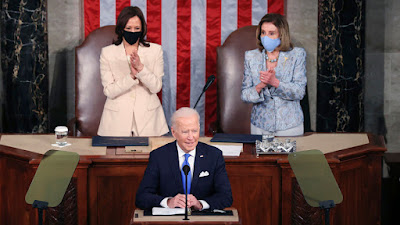 |
| President Joe Biden addresses a joint session of Congress, as Vice President Kamala Harris (L) and House Speaker Nancy Pelosi look on, April 28, 2021 | Chip Somodevilla/Pool via AP |
The first 100 days of a new presidency is an historical standard established during President Franklin D. Roosevelt’s rush to meet the crisis of the Great Depression in 1933. The number of days is arbitrary and the standard subjective, but it has been used by presidents, politicians, the media and historians as an early indicator of leadership style and policy ever since.
University of Denver Chancellor Jeremy Haefner, with the Crossley Center for Public Opinion Research and the Center on American Politics, hosted a presentation by political scientists and experts who reviewed President Joe Biden’s First 100 Days in office and the implications for America’s future domestic and foreign policy.
Tom Cronin - Former President of Whitman College, McHugh Professor of American Institutions at Colorado College
- The Democratic Party has unified, while the opponents are as fractured as they’ve ever been. The Republican Party has no message and no messenger. That won’t last. Their strategy will be to pounce on failures.
- One of Biden’s chief challenges will be keeping the Democratic Party together. Biden has so far been a left-of-center moderate liberal, rather than ultra-liberal. He needs to stay the course in order to keep the center alive.
- Work on police reform, infrastructure and immigration could possibly bring lawmakers across the aisle together for compromises.
- A lot of people are worried about climate change and COVID, but many are deeply worried about the health of our democracy.
- Biden deserves credit for getting Xi and Putin to join him on climate change discussions.
Andrea Benjamin - Professor of African and African American Studies at the University of Oklahoma
- A veteran delegate at the Democratic Convention stated that if Blacks, especially Black women, don’t show up, Democrats won’t win.
- The word for people of color is accountability. On Day One, Biden signed a racial justice executive order. We are watching closely to see if he comes through.
- U.S. cities have had a majority of people of color for a long time, but they have few black mayors. Republicans totally dominate in many states with large black and brown populations. Yes, the country is growing more diverse, but it’s not translating to political power.
- [Actions Biden could take for Black and Brown voters:] African Americans have high student loan debt, and he could follow through with loan forgiveness and moving funding to historically Black Colleges and Universities. He could work on voting rights and access. Wealth disparities and health disparities also need to be addressed.
Seth Masket - Professor of Political Science and Director of the Center on American Politics at the University of Denver
- Biden learned from the experiences of the Obama administration. The work that Obama did reaching out to Republicans was probably not a wise move. Many of the concessions he made probably hurt the economic recovery and bought Obama no Republican votes. Biden learned not to wait around for compromise.
- He has the smallest margin possible in the Senate and a very narrow margin in the House. Ted Kennedy died 9 months into the Obama administration and ended the majority in the Senate. It’s possible that some Senators also may not be there though the end of 2022. He is trying to get as much done as possible as soon as possible.
- On highly salient issues, the parties are as polarized as we’ve ever seen. They don’t speak the same language. Democrats are doing things they’ve said have been needed for years. Republicans are worried about Dr. Seuss and hamburgers.
- Immigration was a misstep from Biden. He was trying to rapidly ratchet down the amount of immigrants, and saw pushback from Democrats.
Floyd Ciruli - Director of the Crossley Center for Public Opinion Research, Josef Korbel School of International Studies, University of Denver
- Biden focused on the pandemic and the economy. They were the public’s top priorities.
- It was a winning strategy. He now has a positive approval rating and strong approval on handling vaccinations and relief checks. He is 10 points higher than Trump after his first 100 days in 2017.
- To maintain Democratic Party unity, Biden issued a record number of executive orders, reversing many of Trump’s orders. His appointments rewarded many constituencies. The relief legislation was massive, which also helped assuage the left wing of the party.
- Style and tone matter and Biden’s low-key style and moderate language were welcomed by Washington and the country. Not dominating the daily news cycle with daily commentary and insults was judged positively.
- The administration mastered Zoom and has voided gaffs. The White House staff is functioning well and the chaos and leaks of the previous four years have mostly receded.
The Chancellor asked what grade would the presenters give Biden: he received four A-’s with caveats related to immigration, social justice issues and the looming 2022 election.
Read more on the Biden Gets an A- for First 100 Days blog.
View the discussion from the May 4 panel.


















